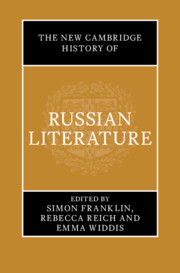Book contents
- The New Cambridge History of Russian Literature
- The New Cambridge History of Russian Literature
- Copyright page
- Contents
- Figures
- Contributors
- Acknowledgements
- On Transliteration, Names, and Dates
- Introduction
- History 1 Movements
- History 2 Mechanisms
- History 3 Forms
- History 4 Heroes
- 4.1 The Saint
- 4.2 The Ruler
- 4.3 The Lowly Civil Servant
- 4.4 The Peasant
- 4.5 The Intelligent
- 4.6 The Russian Woman
- 4.7 The New Person
- 4.8 The Non-Russian
- 4.9 The Madman
- 4.10 The Émigré
- Index
- References
4.6 - The Russian Woman
from History 4 - Heroes
Published online by Cambridge University Press: 31 December 2024
- The New Cambridge History of Russian Literature
- The New Cambridge History of Russian Literature
- Copyright page
- Contents
- Figures
- Contributors
- Acknowledgements
- On Transliteration, Names, and Dates
- Introduction
- History 1 Movements
- History 2 Mechanisms
- History 3 Forms
- History 4 Heroes
- 4.1 The Saint
- 4.2 The Ruler
- 4.3 The Lowly Civil Servant
- 4.4 The Peasant
- 4.5 The Intelligent
- 4.6 The Russian Woman
- 4.7 The New Person
- 4.8 The Non-Russian
- 4.9 The Madman
- 4.10 The Émigré
- Index
- References
Summary
This chapter traces the evolution of a specific character type that began with Aleksandr Pushkin’s Tatiana Larina in Eugene Onegin. In the hands of future authors such as Ivan Turgenev and Fedor Dostoevskii, Tatiana came to represent an ideal for the Russian woman based on soulfulness, fidelity, and self-sacrifice. Russian women writers, too, used Tatiana as a model for their heroines. With the rise of the ‘woman question’ in the 1860s, the Russian woman was redefined to reveal her new potentials in a shifting society, with Nikolai Chernyshevskii’s Vera Pavlovna as a new ideal. In the Soviet period, she was rethought yet again to respond to shifting political mandates, variously downplaying or emphasising her maternal, caregiving side. The faithful, all-enduring Tatiana took on a new form in Anna Akhmatova’s Requiem and continues to evolve in contemporary feminist writing.
Keywords
- Type
- Chapter
- Information
- The New Cambridge History of Russian Literature , pp. 772 - 787Publisher: Cambridge University PressPrint publication year: 2024

